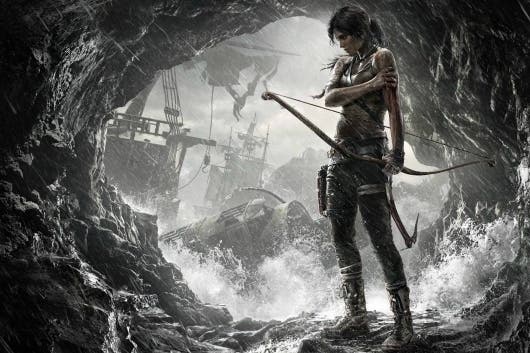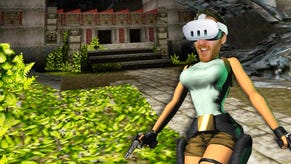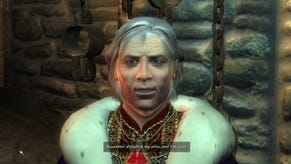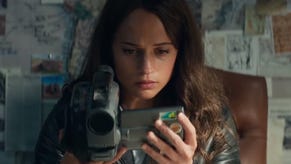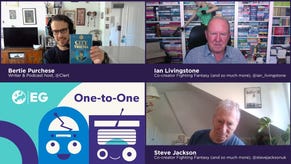Rebooting Tomb Raider
Crystal Dynamics has now been working with Lara longer than the original team at Core - and it's about to make its boldest step.
There's an odd little anniversary that's just passed with zero fanfare. It doesn't help that the dates are a little fuzzy, but it's a moment that's worth registering: at some point last year, Crystal Dynamics surpassed original creators Core in the amount of time it had spent working on the Tomb Raider franchise. Its eight years in charge that began as it took over Anniversary in 2005 eclipse the seven years that the UK studio spent crafting Lara's world.
This is Crystal Dynamics' series now as much as it was ever Core's, so the Americans have earned the right to mix things up a little. Besides, they've got history that stretches back far beyond the moment the series crossed the Atlantic to take residence in the San Francisco studio.
"My old roommate who I used to live with at university lives in London," says Crystal Dynamics studio head Darrel Gallagher, an expat from Bristol who's maintained his British accent despite having been based in the US since 2005 - and who speaks to us in the immediate aftermath of a Bafta event exploring his studio's latest game. "I pinged him yesterday and asked if he wanted to come to the talk. He didn't make it in the end, sadly. But he's the guy who introduced me to Tomb Raider. He was a roommate in my last year, before I got into making games.
"We both had PlayStations, but I was big into twitch games like Tekken and WipEout, and he was playing this in his bedroom. I saw he was playing this game Tomb Raider, and would say it was amazing. Because I was only glimpsing it, I was like really? It looked kind of boring - it wasn't fast-paced twitch stuff. But he finished playing it and gave me the disc, and I was absolutely blown away. I was just totally blown away. I was absorbed."
Noah Hughes, who's been a part of the Crystal Dynamics team since a testing job in the summer of 1993 got a little more serious and who now finds himself at the helm of the Tomb Raider reboot, had his first encounter with Lara from a developer's perspective. "At the time we were doing some non-character-based 3D games at Crystal. We had the 3D engine going, but as a fledgling game designer we were putting a lot of thought into how we could make a character-based 3D game. Some of the other games out there inspired us a lot, like Mario and things like that.
"But then Tomb Raider came along and it just blew us away, because it was so different from those other expressions of 3D gaming. Lara was a real person and this world felt like you were going some place that people could actually go, but you'd never go in your lifetime. That really changed, or broadened my view, of both 3D gaming possibilities, but also character-based games and worlds. It really affected my aspirations for where interactive entertainment was going, and it lit a fire that's still burning to this day."
"Tomb Raider came along and it just blew us away, because it was so different from those other expressions of 3D gaming that had a degree of grounding."
Noah Hughes, creative director
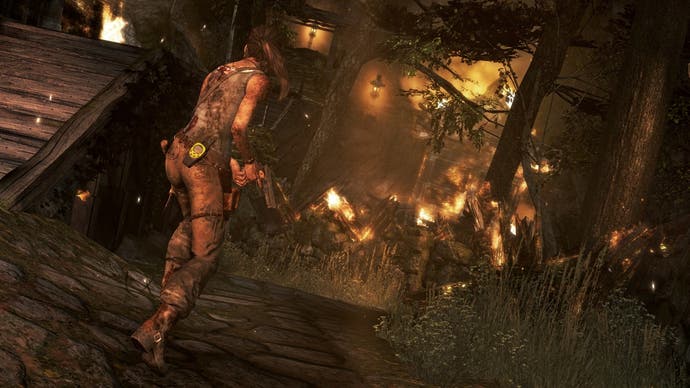
In 2005, the fire was kindled by the prospect of getting to work with Tomb Raider. There was some crossover with Core, with Crystal Dynamics picking up the Derby developer's Anniversary project before shelving it to create Legend, the 2006 game that was a return to the series' roots.
"I had a conversation with our general manager at the time who had secured the deal outside of my visibility," Hughes says of the initial deal. "And I think he was a little nervous. We'd owned all our IP up to that point, but we had this opportunity, he thought it would be really good for us. And for just a second I thought about it, and it clicked.
"It was really just what the doctor ordered. As much as I like a blank canvas for IP, I really felt that Tomb Raider was an almost perfect construction for designing a game within. There was plenty of room to do what we wanted to do within that, and it came with the advantage of being a known property - if we put our all into this, it's something that people would be aware of. It was a really exciting opportunity - there didn't seem to be much downside."
Crystal Dynamics' first Tomb Raider was Legend, a return to form after the incoherent tragedy that was Angel of Darkness. Stripping away some of the excesses that had plagued Core's later games, it was a revival that took Lara back to her bare essentials, displaying Crystal Dynamics' understanding of what makes the series tick. It was, though, a tad reverential. Crystal was handling this new franchise with kid gloves, perhaps understandably so given the legacy.
"Yeah, I think we were," says Gallagher. "We get asked this question a lot - didn't you reboot it once already, people say. I wouldn't say it was really classified as a reboot - it was a reset. And there's a difference in those words! It was really going back to what Tomb Raider was, as there was this perception that it had lost that in prior iterations. It was all about resetting and getting back to the DNA of Tomb Raider, rather than a reboot."
"An analogy would be another singer or another band playing a song," agrees Hughes. "We didn't want to rewrite the song. We really wanted to continue that tradition - but inherently a different singer's going to have a different take on a song. There was going to be a difference in the way we delivered it, and our job was to translate what they had done with our technology and our wheelhouse."
Crystal Dynamics returned to Anniversary next, a remake of the original that Core had been working on before Eidos swapped the series over to America. It was by its very nature another reverential game - albeit a well studied, well executed reverence - and it's not until 2008's Tomb Raider Underworld, many feel, that the studio really put its stamp on the series.
The team at Crystal Dynamics themselves, though, feel like it didn't really make a Tomb Raider with its own identity until afterwards. "At the end of Underworld, we did feel that it was the end of that trilogy," says Gallagher. "It was the last game in that series, and that DNA from the original Tomb Raider had run its course. It felt like it was time to do something new."
What that something new was going to be wasn't yet decided. There were experiments, including the successful Lara Croft: Guardian of Light, a game that shifts the camera to the heavens yet still stays true to the spirit of the series. But the shape the next Tomb Raider proper was going to take was still in flux.
"At first it was a sequel - it wasn't a reboot. But we knew it was going to be something that was fresh and different - and we had to figure out what that meant."
Darrell Gallagher, studio head
"We didn't really know what that was. At first it was a sequel - it wasn't a reboot. But we knew it was going to be something that was fresh and different - and we had to figure out what that meant. We started off more with a set of goals than saying it's a reboot or a sequel. The goals were to make a more human, relatable version of the character. We felt that nine, 10 sequels in, there'd be a lot of people who'd been along that journey, a lot of people new to it and a lot of people who had dropped off. We needed to get people to know this character again. That was certainly one of the big goals, of making her feel less superhero and more human."
"Some of the survival themes came about before the origins or reboot stuff came about," says Hughes. "We knew looking at it that her ability, her infinite wealth - we wanted to put her in a situation where she couldn't rely on that. Ideas like the island came up really early. It was really to highlight her character - and from there, the origins story layered in. If we really want to reintroduce you to her character, and we want to create a relatable hero, let's start from that position closest to you and I. It had a lot of those flavours as a sequel - and it's that Lara origins piece that clicked it all into place."
And so Crystal Dynamics landed with Tomb Raider, the gritty reboot that's been teased over the last two years. It's been a protracted reveal, and at times a turbulent one, the excitement of its initial announcement seguing into a series of PR beats met with derision from a vocal online community.
"The bumps have been well publicised, and we're certainly aware of it," says Gallagher. "We've always been confident with the game and what we've been doing with the game. Certainly we listen, but there haven't been any fundamental changes - and there's the belief that when people play this game and experience it they'll have a true sense of what it is. It's hard at times to communicate in snapshots what a full game is, and what we know is that we've had great responses publicly, and we've had some bumps publicly.
"But what we know is that when people have come into the studio and played it we've had an overwhelmingly positive response, so I've been confident in what we're doing. Our general feeling has been that our work does the talking - and when the game comes out, we understand it's a change and that's going to be hard, and it's going to generate speculation and that's okay."
Crystal Dynamics insist there are no regrets over some of the unfortunate marketing - and insist that it's a problem inherent with creating a game on such a grand scale. "We intentionally made a game that's very different at the beginning than the end, and includes such a variety in tone that it's been very hard to show it in snippets," says Hughes. "It's a hard problem to solve, and basically people are so invested in this that whatever they get they want to extrapolate what Tomb Raider's going to be, but whatever we give them, it's not enough for them to really understand what we're doing."
Amidst the violence and the shrieking of press demonstrations, there's been understandable concern that the spirit of Tomb Raider - the large, lonely spaces that are open for exploration - has been lost. "It's an important part of Tomb Raider, and it's tough to show that because you have to get lost in an environment and be absorbed by it," says Gallagher. "We see people doing this in the largest environments we've ever built, but it's not something you can show in a stage demo at E3. As Noah was saying, that makes it tough, because what's great about this game is the broad palette of experiences that you get.
"The message that I would love people to take away from our conversations is that this is a game with these three pillars - puzzles, exploration and combat - and they're still there. In fact, the exploration is full, if not fuller than before. There's the ability to get lost, the ability to find tombs and the ability to access areas that are gear-gated."
"I remember what the front page of The Sun looked like when Daniel Craig was cast, and now it's a billion dollar franchise, right?"
Darrell Gallagher, studio head

Regardless of any problems Square Enix and Crystal Dynamics have had with the messaging, there still remain underlying questions about the game - such as did Tomb Raider really need a gritty reboot, and do we really need a more human take on one of the most widely recognised video game icons? For some - myself included - it has sometimes felt like an exercise as odd as creating a grittier Mario, wrestling with existential angst as he tentatively kills his first goomba.
"I think it always feels crazy, but if you look at something like Bond as a great example," says Hughes, "the idea is you're almost obligated to make it relevant for each generation. I think until that happens, it's like 'what, you're changing things!' But once it happens there's a peace, and as an industry we're young enough that it feels strange to games mainly because there's not that many properties out there."
"What's unique about us, along with Mario, is we've probably been around for one of the longest periods in the industry," says Gallagher. "We're faced with something that many other properties will be faced with along the way. We're certainly not the first, but we're one of the early ones and there'll be a lot more after. When you look at the Batmans and the Bonds, properties that have lasted from generation to generation, they have been bold, and they have taken risks. Look at the most recent Bond - I remember what the front page of The Sun looked like when Daniel Craig was cast, and now it's a billion dollar franchise, right? So that change is always something that's scary, and certainly not everyone will accept it at first."
There's another nagging concern with this Tomb Raider reboot, though it's perhaps something endemic to modern video games rather than anything else. With its breadth, its checklist of systems and its appetite for grand spectacle, there's been a nagging sense that this is a game designed in the boardroom rather than one that's in tune with a focused creative drive. The days of singular visionaries like Tomb Raider creator Toby Gard may have been lost in the crowds involved in making big budget games, but is it a concern that Crystal Dynamics understands?
"Well, that's the thing. We do have a hierarchy," says Gallagher. "It isn't 100 people in a room saying here's my idea, let's get it in. Naturally there's a lot of contribution, but there has to be order to the chaos, otherwise you'd just get soup. It was very important that we had a clear hierarchy in terms of where the franchise was going.
"Things like Guardian of Light and this game would never have happened with pure consensus. You'd have a lot of great ideas, and maybe some of them would work, but you have to be less consensus-driven than that. On a high level we absolutely do have individuals like Noah and myself who are at the helm of a franchise. That direction comes from far fewer individuals than a team."
There's a vision behind this Tomb Raider, then, even if it's one that's proved divisive in the run-up to its launch. "Not everyone's going to agree with every choice that we've made - they're radical changes to a beloved franchise - but hopefully when they get their hands on the game and play it they'll respect those choices and enjoy the game in the way we think they deserve to. We've tried to make the right choices, but mainly it's about something we believe in."
It's only a fistful of days until we'll know whether Crystal Dynamics' belief has paid off, and whether some of the heated response will cool into an appreciation of this bold new Tomb Raider. The series might have been in Crystal Dynamics' care longer than it was with Core, but it's been with the fans since the start - and right now they're waiting to be convinced.
